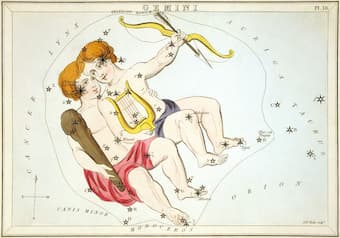
“Gemini”, plate 18 in Urania’s Mirror by Jehoshaphat Aspin
Between 21 May and 21 June, the sun transits the constellation of Gemini. This third astrological sign represents the twins Castor and Pollux. In Greek and Roman mythology, they are twin half-brothers. Their mother was Leda, but they had different fathers. Castor was the mortal son of Tyndareus, the king of Sparta, while Pollux was the divine son of Zeus. When this time, crafty Zeus transformed himself into a swan in order to seduce Leda. The boys were inseparable in their looks and actions, and Castor became a great horseman and Pollux a great fighter. They embarked on many great adventures, but Castor was mortal and killed in battle. Pollux pleaded with Zeus to give Castor immortality, and he united them together in the heavens.
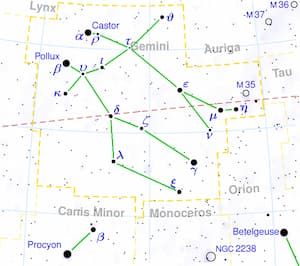
Constellation of Gemini
In his Sonatas and Interludes for Prepared Piano, John Cage focused his interest on Eastern thoughts. At that particular time his focus fell on Hindu aesthetics, particularly the Indian theory of the nine permanent emotions, with tranquility at the center. In addition, the celestial twins “Gemini” are inseparably combined in the Sonatas No. 14 and 15.
John Cage: Sonatas and Interludes for Prepared Piano, “Sonatas No. 14 and No. 15 Gemini” (Boris Berman, prepared piano)
Robert Schumann
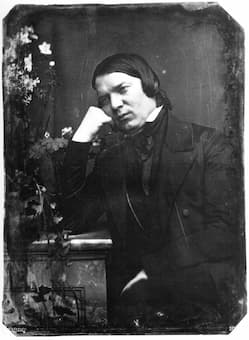
Robert Schumann, 1850
When it comes to famous composers born under the tropic of Gemini, we seem to have a rather huge selection. However, it’s not really difficult to find the poster child for this particular star sign. That honor must go to Robert Schumann, born on 8 June 1810. While most signs have one very prominent trait, Gemini “represents two different personalities in one. They are sociable, communicative and ready for fun, with a tendency to suddenly get serious, thoughtful and restless.” They are fascinated with the world itself, extremely curious, with a constant feeling that there is not enough time to experience everything they want to see. Schumann even invented the characters of “Florestan” and “Eusebius” who appear in his criticism and in the titles of some of his character pieces. Florestan is named after the hero of Beethoven’s opera Fidelio, and represents the impulsive, fiery, and quick-witted side of Schumann’s personality. Eusebius, on the other hand, is named after a 4th century abbot and saint, and he represents Schumann’s dreamy and reflective side. Much of Schumann’s criticism, and by extension his music, is conceived as a conversation between these two characters. Here is what they had to say about Chopin, “Eusebius quietly opened the door the other day. You know the ironic smile on his pale face, with which he invites attention. I was sitting at the piano with Florestan. As you know, he is one of those rare musical personalities who seem to anticipate everything that is new, extraordinary, and meant for the future. But today he was in for a surprise. Eusebius showed us a piece of music and exclaimed: ‘Hats off, gentlemen, a genius’.”
Robert Schumann: Carnaval, Op. 9
Richard Wagner
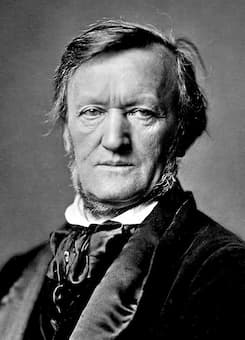
Richard Wagner, 1871
Born on 22 May 1813, Richard Wagner has been described as “the constant union between profound reflection and ebullient spontaneity. With him, excessive thinking had not dulled his vital spark, and whatever life’s vicissitudes, he never ceased to philosophize, combining a calculating, metaphysical intellect with the joy and eternal youth of a truly creative temperament.” Even one of his greatest nemeses, the critic Eduard Hanslick conceded that Wagner “was the most remarkable phenomena, a marvel of energy and endowment.” Wagner certainly had a volatile temperament and was highly emotional. “He was quick to anger, quick to tears, quick to laughter and quick to frenzy.” True to some characteristics of Gemini, Wagner was highly intelligent, and he was a bookworm. Due to his intelligence, Wagner tended to be overly analytical, and frequently he comes across as indecisive. Yet he certainly could be stubborn to the point of telling the King of Bavaria exactly what needed to be done. It has been said that dating a Gemini can be difficult because they struggle with commitment. Indeed, Wagner left a string of bludgeoned relationships in his wake that could easily attest to this assertion. All in all, it seems that Richard Wagner fit the characteristics of being born under the tropic of Gemini rather well.
Richard Wagner: Siegfried Idyll
Edward Elgar
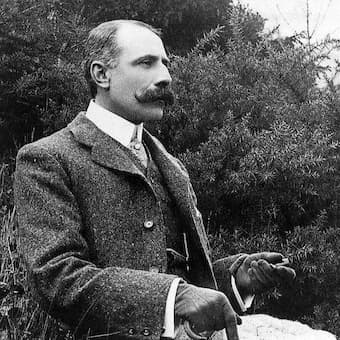
Edward Elgar
In accordance with Gemini characteristics, Richard Wagner was enthusiastically social. He loved to be the life of the party, and if we can trust contemporary reports, he just couldn’t stop talking. Even Robert Schuman said, “Wagner is impossible; there’s no doubt that he is an intelligent person, but he never stops talking.” Edward Elgar, born on 2 June 1857 was not known as an incessant talker, but he certainly projected a confident and robust personality. He dressed in tweed and sported a big walrus mustache. He looked very much like a cartoon figure, a satire of everything stereotypically British, “from pompous patriotism to the strict class system.” However, his strong personality in his music and elsewhere is always tinged with melancholy, self-doubt and pessimism. It has been said that he “often conducted his music with tears running down his face, as he was so moved by the memories it brought.” Elgar’s musical personality stems from his native countryside, and when he looked over his life as a composer, he wrote, “I am still at heart the dreamy child who used to be found in the reeds by Severn side with a sheet of paper trying to fix the sounds and longing for something great.”
Edward Elgar: Cello Concerto, Op. 85
Erich Wolfgang Korngold
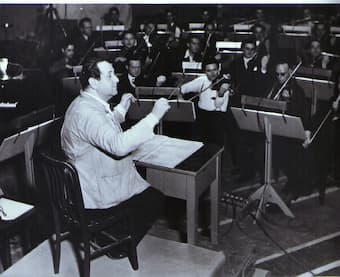
Erich Korngold conducting at Warner Brothers Studio
For Gemini composer Erich Wolfgang Korngold, born on 29 May 1897, two different musical personalities were not merely a matter of fact but a matter of survival. He may well have been the most phenomenal musical prodigy of all time. At the age of 9 he played his cantata Gold to Gustav Mahler, who pronounced him a genius. Merely two years later he composed the ballet Der Schneemann (The snowman), which caused a sensation at the premiere performance at the Vienna Court Opera in 1910. Various compositions for chamber ensemble and solo piano quickly followed, and Richard Strauss wrote, “One’s first reaction that these compositions are by a child are those of awe and concern that so precocious a genius should follow its normal development…This assurance of style, this mastery of form, this characteristic expressiveness, this bold harmony, are truly astonishing!” In 1934, Korngold was invited to work on a long series of Hollywood film, and André Previn candidly wrote, “Korngold was a master film composer. His wonderful melodies, orchestrated in the most gorgeous Richard Strauss-oriented manner, are a joy to hear, even when the films are forgettable.” Korngold and his family were forced to settle in the United States after the National Socialist came to power, and as a composer Korngold naturally dipped into the wellspring of his Gemini personality. Other composers born under the tropic of Gemini include Grieg, Stravinsky, Richard Strauss, Albinoni, Glinka and Offenbach; what a musical constellation!
For more of the best in classical music, sign up to our E-Newsletter
Erich Wolfgang Korngold: “The Adventures of Robin Hood”
